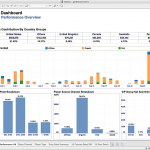Collecting Data & Interpreting Data Are Two Different Things – It’s Time to Start Acting Like It
We’re living in a world where data is all around us, being constantly created, collected
and controlled at any given moment. By as soon as 2018, there will be a estimated
21 billion products world wide connected to the Internet. All of those devices will be
creating data every second that they’re on, sharing it amongst themselves in an effort
to make both our personal and professional lives better in any way that they can. In 2013,
companies spent an estimated $31 billion on the types of projects and tools that allowed
them to collect this data. That number is expected to increase to an astounding $114 billion by 2018.
We’re living in an age where a full 65% of executives in nearly every form of business that you can think of say that embracing big data is a step that they MUST take to remain competitive. Yet despite this, according to Vision Critical only 0.5% of the data that is being collected is actually being analyzed and interpreted. To break it down on a company-by-company basis, most organizations estimate that they’re only able to analyze about 12% of their available data according to Forrester Research.

Business person standing against the blackboard with a lot of data written on it
Why is that?
Because collecting data and interpreting data are two entirely different things and should be treated as such. This is why people like data scientists are so important – they’re translators, essentially. They take the gigabytes upon gigabytes of data that your organization is collecting and translate it into a language that you can actually understand and learn from.
Who is a Data Scientist?
At their core, data scientists are the people who are supposed to be analyzing and interpreting the complex data that your organization has been collecting. You’re probably using a huge range of different tools to actually collect that data, from customer relationship management systems to other marketing tools and more. Without making an effort to dive beyond what those numbers are trying to tell you to get at the core of what is hidden underneath, however, data is ultimately just that – information.
Data scientists regularly use data to not only extract valuable insights from various sources, but to help leaders in a business make the most actionable, informed decisions possible. A data scientist might use the statistics of your website to point to certain improvements you can make based on trends, real-time customer usage stats and other information.
So if you really want to interpret your data in the best possible way, this must mean that you need a data scientist, right? Not necessarily.
The Science of Interpreting Data
Far too many business leaders look at data scientists as an “all or nothing” proposition. They think to themselves “either I’m going to hire a data scientist to interpret my data, OR I’m going to find a way to do it myself.” While this does make a certain amount of sense, it overlooks a very critical element – interpreting data is a science in and of itself and oftentimes a combination of methods will be required to unlock the true value that these ones and zeroes bring into an organization.
Case in point: a number of technologies exist that actually help automate the process of data interpretation, providing you’re able to collect the right type of quality data in the first place. Natural Language Processing, for example, can use a complex mixture of various analytical techniques to produce reports, data visualizations and more – all on demand. With the right tools in place, nearly anybody can correctly interpret data – without spending a huge amount of money on a specific education.
So does this mean you DON’T need a data scientist in order to correctly interpret your data? Again – not necessarily.
The Myth of the “One Size Fits All” Approach to Data
At the end of the day, it is likely a combination of different methods that are going to be required to correctly interpret your data – but this will vary largely depending on the needs of a specific organization. Some will have so much data and have such a pressing need for insight that data scientists are absolutely the right move. Others may not necessarily have a specific problem that they’re trying to solve with data, or enough quality data to make it a worthwhile step to take in the first place.
For those groups that fall decidedly in the middle (which will be most businesses), various technologies like NLP AND people like data scientists and analysts will be required to give themselves the types of advantages and opportunities needed to stay competitive moving forward. Those technologies will be used to automate as much of the process as possible, freeing up the essential time of the hardworking men and women who will use the expertise, the knowledge and the human intuition that only they can bring to the table to help propel a business into the future.
Visit our homepage, subscribe to more articles and updates.








